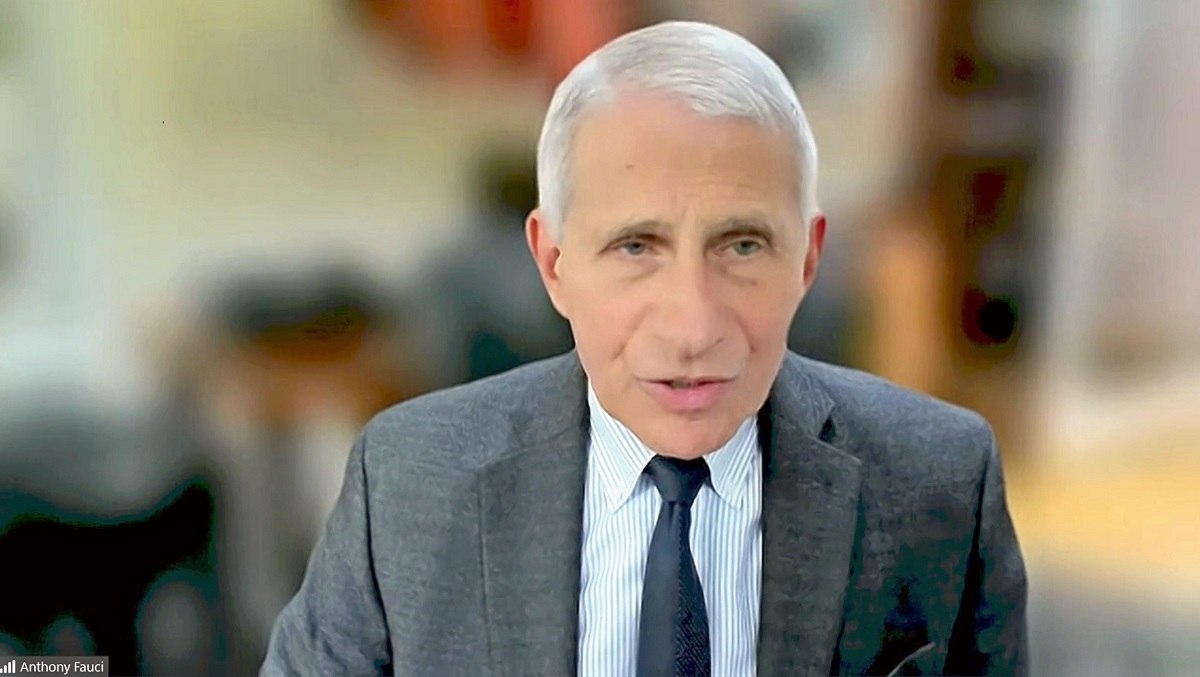
Anthony Fauci speaks with The Yomiuri Shimbun in an online interview on Wednesday.
2:00 JST, May 14, 2023
WASHINGTON — Thursday marked the end of the United States’ federal public health emergency for COVID-19, after three years and two administrations. The day before the scheduled change, The Yomiuri Shimbun spoke with Dr. Anthony Fauci, who helmed the U.S. pandemic response under Presidents Donald Trump and Joe Biden.
In the online interview, Fauci, 82, emphasized that the end of the PHE (public health emergency) did not mean the pandemic was completely over and warned that the world needed “to be prepared for the possibility that we may have another surging of cases … not only in the United States but anywhere globally, including in Japan,” while acknowledging that the overall global situation was much improved.
Fauci served as director of the National Institute of Allergy and Infectious Diseases from 1984 to December of last year, advising seven presidents and their administrations on domestic and global health crises ranging from HIV/AIDS to Ebola and COVID-19. With his daily appearances at televised White House briefings alongside Trump administration officials, Fauci quickly became a household name during the early days of the pandemic, calmly informing the public about the evolving situation and measures people could take to mitigate the spread of the virus.
He was largely seen as a reassuring voice of reason while former President Trump promoted scientifically unproven medications against COVID-19, such as hydroxychloroquine and ivermectin. Fauci reflected on what he described as “the denial of seriousness” at the time, criticizing the “considerable amount of misinformation” that was coming “from the highest authority in the land,” which unfortunately had “much more of a negative impact.”
The U.S. Centers for Disease Control and Prevention estimates that more than 1.1 million American deaths have been attributed to COVID-19. Fauci said this was in part due to the “very fractured public health system, where you have 50 states and territories doing things not in a uniform way” and therefore not being able to provide a “unified type of response where the entire country pulls together.” He continued: “The disparities in health became very amplified during the outbreak. We had a higher degree of hospitalization and death among the minority populations that did not have as good access to health care as the general population.”
Fauci also blamed a health care system that was “disassociated from the public health system,” leading to critical real-time information delays especially with regards to viral evolution. “We had some states that were promoting vaccines and unfortunately and tragically, some states that were not promoting vaccines. We had some states that were promoting the use of masks … and other states that were encouraging not to use masks. So, we did not have an optimal public health response.”
While praising “a very good scientific response,” citing the rapid development and distribution of safe and effective vaccines, Fauci also admitted that the United States wealth and resources did little to protect it from “the weaknesses in [the] public health system,” leading to an unacceptably high death per capita rate.
In contrast, Fauci gave Japan “good marks” on its pandemic response, commending the “population that adhered to the recommendations of public health authorities,” assessing that it had done “relatively speaking, very well” when compared to other developed nations.
On lessons learned, Fauci spoke of how he and other scientists “kept getting surprised” by how COVID-19 behaved so unlike other respiratory diseases, from its ability to consistently mutate over the course of the pandemic, to its capacity to spread via asymptomatic aerosol transmission.
However, one of the most disturbing aspects of the pandemic was not of viral nature, but of human nature. Because Fauci became the de facto face of the coronavirus pandemic response, he was subject to a near constant stream of vituperative attacks by those fueled by misinformation, disinformation and Republican rage. He warned of the dangers of disinformation during a public health crisis, stating that it could “actually lead to the unnecessary loss of lives.”
When asked about the media’s role during a pandemic, Fauci called upon legitimate, established outlets such as The Yomiuri Shimbun “to give correct information to the public … based on evidence, based on data and based on truth … to be able to counter the misinformation and disinformation” disseminated indiscriminately by social media.
Lastly, he imparted that “science should never let politics interfere with the seeking for an expression of the truth. The definition and nature of science is the process of getting to the truth with data and with evidence that is compatible with the political world, so as long as you don’t let politics interfere with or influence how you look at the truth and data and evidence.”
Top Articles in Science & Nature
-

Japan Institute to Use Domestic Commercial Optical Lattice Clock to Set Japan Standard Time
-

iPS Treatments Pass Key Milestone, but Broader Applications Far from Guaranteed
-

Record 700 Startups to Gather at SusHi Tech Tokyo in April; Event Will Center on Themes Like Artificial Intelligence and Robotics
-

iPS Cell Products for Parkinson’s, Heart Disease OK’d for Commercialization by Japan Health Ministry Panel
-

Japan to Ban Use of Power Banks on Airplanes
JN ACCESS RANKING
-

Japan PM Takaichi’s Cabinet Resigns en Masse
-

Japan Institute to Use Domestic Commercial Optical Lattice Clock to Set Japan Standard Time
-

Israeli Ambassador to Japan Speaks about Japan’s Role in the Reconstruction of Gaza
-

Man Infected with Measles Reportedly Dined at Restaurant in Tokyo Station
-

Videos Plagiarized, Reposted with False Subtitles Claiming ‘Ryukyu Belongs to China’; Anti-China False Information Also Posted in Japan






















